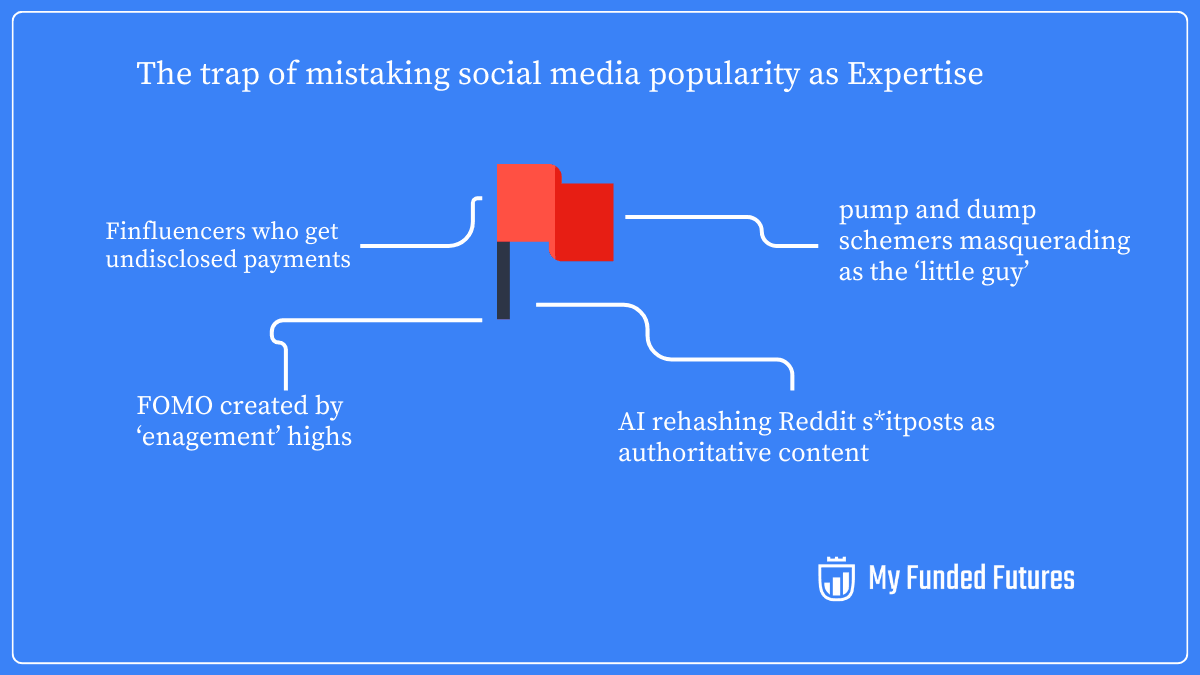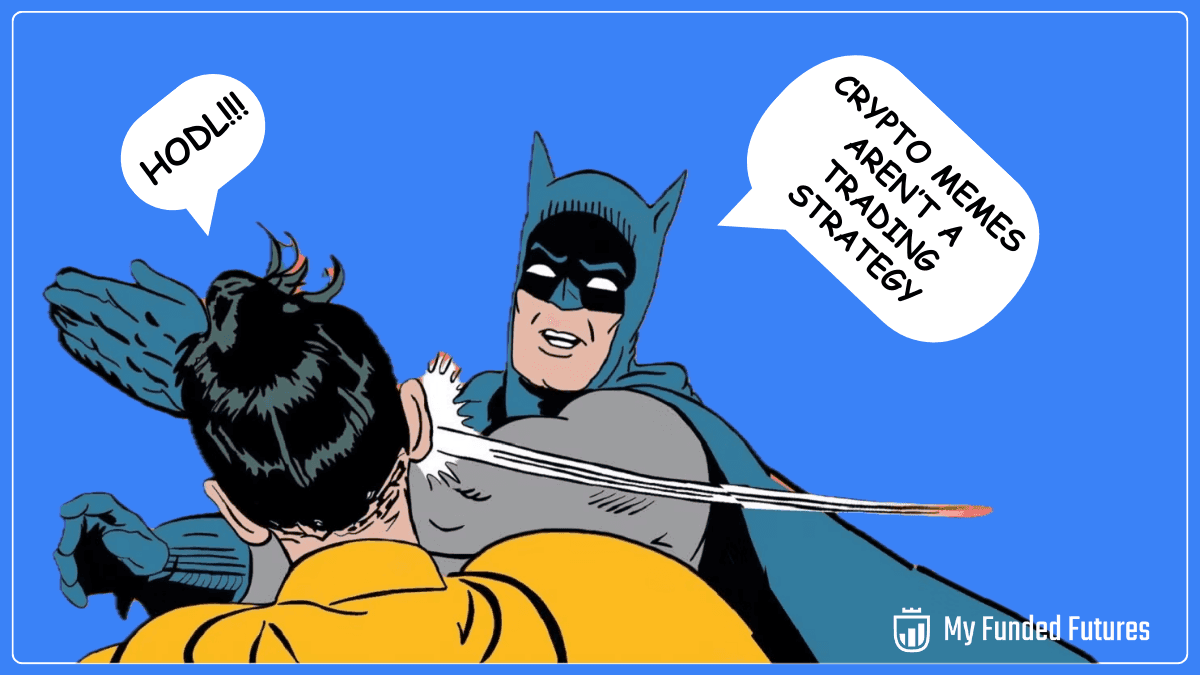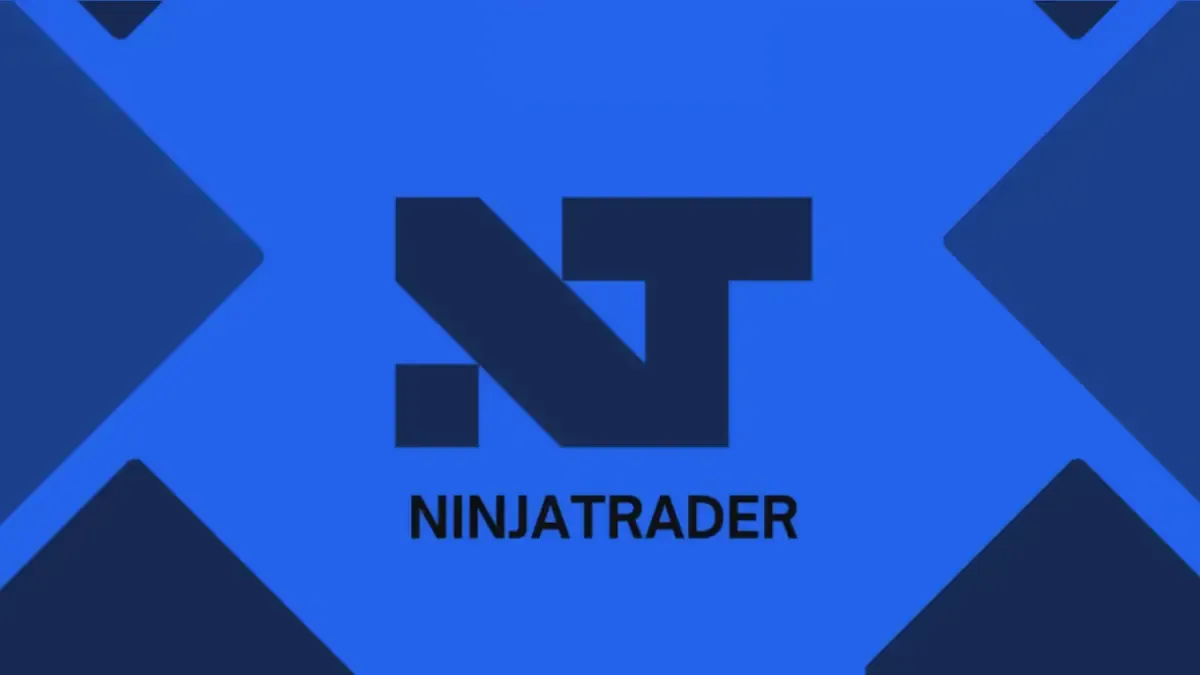Social media has become a staple for futures traders and beyond, and for good reasons. Watching charts or reading economic reports alone just doesn’t cut it anymore.
Online communities feel like a real-time trading floor — you get access to like-minded communities , real-time market information and get to build analytical skills. Used wisely, platforms like Reddit, Discord, and X offer useful clues about market mood or breaking news. But following the online crowd blindly is dangerous.
The key is learning how to extract genuine value from social communities while avoiding the pitfalls that consistently trip up retail traders.
Trap #1: Mistaking Popularity for Expertise
The top posts with millions of views you see on social media aren’t coming from ‘trading expertise,’ they are there by acing engagement algorithms.
Tips from such posts can create short-term price movements, but these effects rarely persist beyond a single trading session, the European Securities and Markets Authority (ESMA) has warned.
Coordinated actions to drive up and down the prices of commodities or other assets may feel like a “common man’s uprising” but more often than not, they are just driven by a small number of committed individuals looking to profit .
The International Organization of Securities Commissions (IOSCO) warns that financial influencers often lack proper qualifications and may promote products simply because they receive undisclosed payments.

To add to this, following specific “finfluencers” creates information bubbles of like-minded content, reinforcing confirmation bias and blinding traders to alternative perspectives, the CFA Institute says.
If those are not reason enough, now there is the newly-built-up risk of AI amplifying fraudulent or infactual news.
Data from Semrush shows Reddit now accounts for over 40% of citations in AI-generated responses from ChatGPT, Perplexity, and Google's AI tools.
This means what are just casual social media discussions, including potentially satirical or misleading posts, are being repackaged as authoritative information using AI.
Cut short, a trending Reddit post or a popular X thread is not the same as vetted financial research.
It’s easy to equate visibility with credibility — especially when an idea is upvoted thousands of times or echoed by many voices. But remember: search engines and social platforms reward engagement, not accuracy.
Don’t outsource your judgment to the hive mind.
Trap 2: Blindly Copying Stock, Crypto Memes in Futures Trading
“HODL” works as a great meme, and hey, it may just work for cryptocurrencies — but when it comes to futures trading, holding positions indefinitely until they recover is catastrophic.
Futures contracts use significant leverage, meaning small adverse moves can quickly overwhelm your account. The CFTC has warned that losses in futures can far exceed initial deposits, especially when traders jump in after seeing hype online.

At the height of retail-driven surge in certain U.S. stocks like GameStop and AMC in 2021, posts on Reddit and other platforms were fueling speculative stampedes into commodities like gold and silver, causing brief but extreme price swings.
Many latecomers who chased these social-media-driven spikes lost big when the frenzy reversed, CFTC warned.
Futures contracts are fundamentally different from stocks or coins. Equities and crypto have an indefinite horizon – you can hold them for years hoping they recover from a dip. Futures, by contrast, expire on a set date. You can’t simply hold a losing futures position indefinitely and wait for eventual recovery.
Unlike stocks or crypto, you can’t just wait out a bad position in futures. That’s also why proprietary firms impose strict daily loss and drawdown limits — to prevent traders from turning one FOMO-driven entry into a blown account.
Trap 3: Forgetting That Leverage Cuts Both Ways
Scroll through trading timelines on X or subreddits and you’ll often see flashy screenshots of traders turning a few hundred dollars into several thousand virtually overnight.
It’s usually futures or other leveraged bets behind those spectacular gains. Treat these posts as a red flag.
What the viral “gain porn” rarely shows is the flipside: leverage can just as quickly multiply small losses into account-ruining disasters.
Unlike buying stocks outright, where you can only lose the amount you invested, futures let you control a large contract with a small margin deposit.
This built-in leverage means small price moves can translate into outsized profits – and equally outsized losses .
At just five to 20% of a contract’s value, you get exposed to the full price swings of the underlying asset.
If the market moves in your favor, great. But, if not? Your losses will snowball far beyond what you put at stake; maybe even exceeding the funds in your account.

Regulators have been beating this drum about risk-amplification all across the globe for a while. The CFTC has warned that traders lured in by online hype often end up losing far more than they bargained for once leverage kicks in. In fact, the CFTC’s own 2024 analysis confirmed that the majority of individual retail futures traders lose money in the long run.
Most retail traders are drawn by the prospect of quick wins, but over time the combination of high leverage and short-term speculation leads to an uphill battle.
This phenomena isn’t geo-limited either. India's Securities and Exchange Board provided data for 2025 that showed over 91% of retail traders lost money in derivatives in the country, with combined losses of ₹1.05 trillion ($12.7 billion), with average loss per trader at $1,250. By contrast, proprietary trading firms booked ₹330 billion ($3.7 billion) in profits, with 96% of gains coming from algorithmic strategies rather than discretionary social media-influenced decisions.
For every screenshot of a lucky home run trade, there are countless unseen wipeouts. Don’t let social media’s survivorship bias fool you. Manage your risk rigorously, use stop-loss orders, and never trade with money you can’t afford to lose (what the CFTC calls “risk capital”).
Leveraged trading is a hard game for the little guy to win consistently.
Recipe For Success
At MyFundedFutures, we've consistently observed that traders who successfully navigate social media maintain strict boundaries and treat online discussions as just one input among many.
Here’s a simple checklist to follow:
- Treat social as sentiment input, not trading signal.
- Always verify with CME/CFTC, your broker platform, or official data releases.
- Never risk more than your pre-defined stop.
This material is provided for educational purposes only and should not be relied upon as trading, investment, tax, or legal advice. All participation in MyFundedFutures (MFFU) programs is conducted in a simulated environment only; no actual futures trading takes place. Performance in simulated accounts is not indicative of future results, and there is no guarantee of profits or success. Fewer than 1% of participants progress to a live-capital stage with an affiliated proprietary trading firm. Participation is at all times subject to the Simulated Trader Agreement and program rules.
Frequently Asked Questions
Rate this article
Related Posts
Read our most popular posts
Which Prop Firms Offer Daily Payouts and How Do They Work?
Daily payout prop firms let traders withdraw profits far more frequently than traditional models, sometimes even from the very first funded day. Instead of waiting weeks for a payout cycle, traders can request withdrawals every day, subject to rules on drawdown, buffers, and minimum amounts. This guide explains how daily payout structures work, which futures prop firms are known for fast withdrawals, what to watch out for in the fine print, and how MyFundedFutures’ Rapid plan fits into this newer payout landscape.
What Is MyFundedFutures Scale Account and Is It The Right Plan For You?
The MyFundedFutures Scale Account is a middle-tier evaluation plan that balances affordability with growth potential. The scale plan offers weekly payout opportunities with increasing withdrawal limits, no daily loss cap, and a clear path to live funding after just five consecutive payouts.
5 Best Prop Firms With NinjaTrader Integration
NinjaTrader's advanced charting and precision execution tools make it a top choice for active futures traders, but not every prop firm integrates it smoothly. We'll highlight five firms that support true NinjaTrader compatibility, how their setups compare, and which one gives you the most stable, consistent path from evaluation to funded account.


